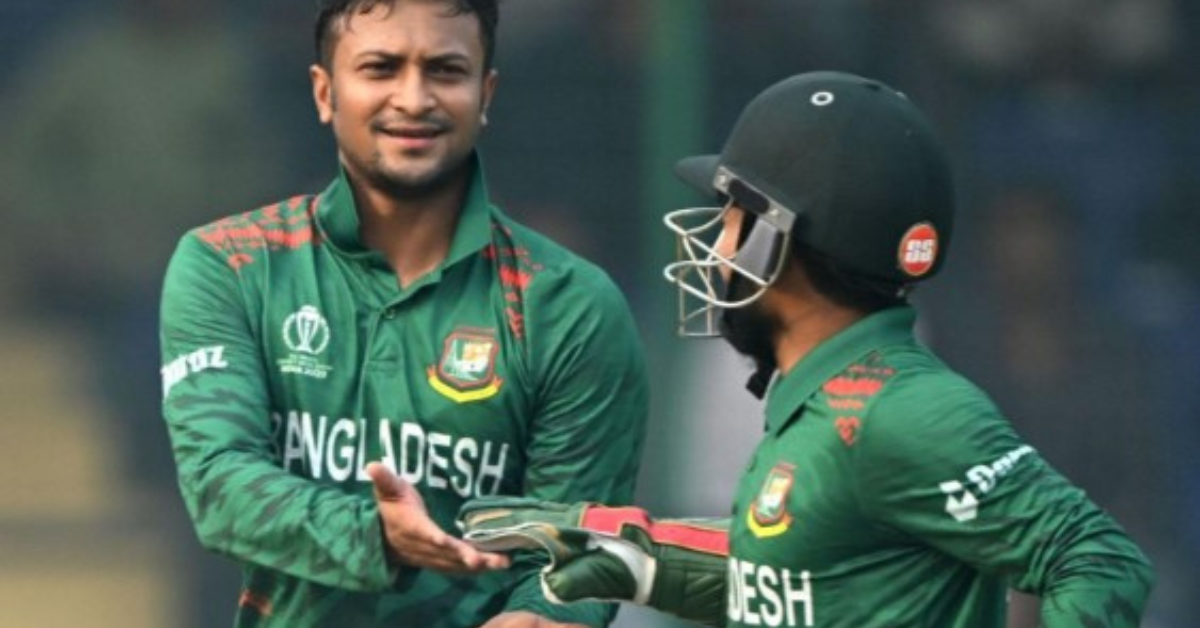- Molly O’Callaghan, a 19-year-old swimmer from Australia, etched her name in the annals of swimming history with a remarkable performance in the Women’s 200m Freestyle event
- Akshay Bhatia, 21, Wins his First PGA Tour Title at the Barracuda Championship
- Bruno Fernandes Replaces Harry Maguire as New Man Utd Captain
- Lionel Messi Surprises Teammate in group chat ahead of Grand Unveiling
- Man Utd Sign Keeper Andre Onana from Inter
Shakib Al Hasan’s ‘Timed Out’ Controversy
- Updated: November 7, 2023
- 432

Shakib Al Hasan’s ‘Timed Out’ Controversy In a recent World Cup cricket match between Bangladesh and Sri Lanka, a highly unusual event occurred that left cricket fans and experts scratching their heads. Angelo Mathews, a seasoned Sri Lankan batsman, became the first player in the 146-year history of international cricket to be dismissed under the “timed out” rule. This unprecedented incident sparked debates, discussions, and reflections on the interpretation of cricket rules and the spirit of the game.
The “timed out” rule, which is covered by Law 35.1 of the Laws of Cricket, states that once a batsman’s partner is out, the incoming batsman has a maximum of two minutes to take their position at the crease. Failure to do so results in a “timed out” dismissal, where the batsman is declared out without facing a ball. It’s a rule that exists to maintain the pace of the game and prevent unnecessary delays.
In this particular match, Mathews found himself in a rather unique situation. When he walked in to bat, he realized that the strap on his helmet was not secure. Concerned for his safety, he decided not to take his position at the crease until the issue with his helmet was resolved. As a result, Mathews exceeded the two-minute limit allowed to take his stance.
This is where the controversy began. Bangladesh’s captain, Shakib Al Hasan, made the bold decision to appeal for a “timed out” dismissal, citing the delay caused by Mathews’ helmet issue. Shakib’s decision surprised many, as this rule is rarely invoked in international cricket, and appealing for it is even rarer.
Shakib’s appeal opened a Pandora’s box of questions. Did he interpret the rule correctly? Was it in the spirit of the game to dismiss a batsman in such circumstances? Were there alternative ways to address the situation?
Shakib, speaking after the match, revealed that he “didn’t know if it was right or wrong” but felt compelled to act. He acknowledged that the umpires questioned the seriousness of his appeal and asked if he would withdraw it. Shakib stood firm, maintaining that he had acted within the laws of the game. He said, “I don’t know if it’s right or wrong. I felt like I was at war. Whatever I had to do, I did it. There will be debates. Today, the timed out helped, I won’t deny that.”
Sri Lanka’s captain, Kusal Mendis, expressed his disappointment with the situation, suggesting that a bit of common sense should have been applied. He pointed out that there were only five seconds left for Mathews to take his position at the crease when he realized the issue with his helmet strap. Mendis believed that the umpires should have intervened and made a judgment call to allow Mathews to fix the problem.
The incident raises broader questions about the spirit of cricket, the role of the players, and the interpretation of the rules. Cricket is often celebrated for its tradition, sportsmanship, and the “gentleman’s game” ethos. While the rules are essential for maintaining order and fairness, they are also open to interpretation and situational judgment.
It is worth noting that the “timed out” rule is rarely invoked because it is considered one of the harshest ways to dismiss a batsman. In most cases, players and umpires prefer to address equipment issues or delays with a more lenient approach, emphasizing the safety and well-being of the players.
This incident serves as a reminder that while cricket is governed by a set of laws, it is also guided by a deep sense of sportsmanship and the unwritten rules of fair play. It raises questions about whether a strict interpretation of the rule is always in the best interest of the game’s spirit.
In the end, the “timed out” controversy in the Bangladesh vs. Sri Lanka match will go down in history as a unique and rare event. It serves as a conversation starter for cricket enthusiasts, prompting discussions about the balance between adhering to the laws and preserving the essence of the game. The incident also highlights the unpredictability and drama that make cricket a sport full of surprises and controversies, even after 146 years of international competition.
For More Related Updates Please Visit Our Official Website
By- Sahiba Suri










